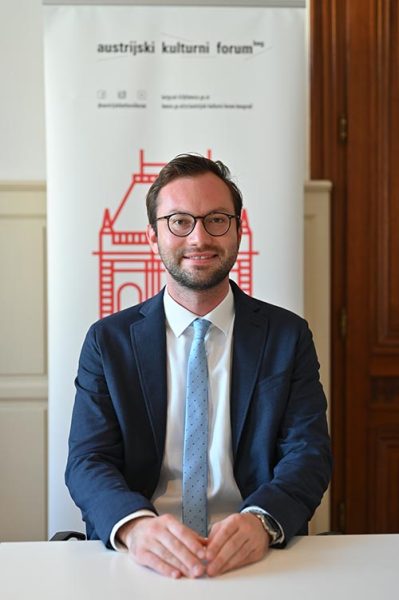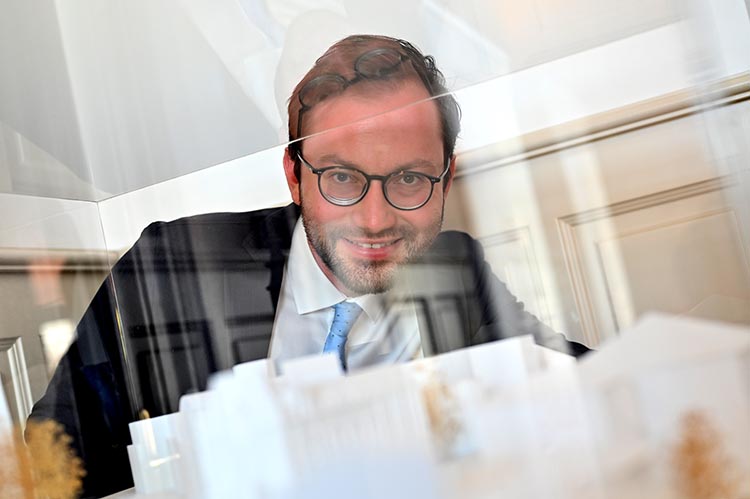We are grappling with an unprecedented series of crises, which are being actively addressed in the fields of the arts, culture and science. The upcoming cultural programme of the Austrian Cultural Forum will centre on ecological sustainability, dignity and regeneration, recognising the necessity to respond to these contemporary challenges
Established in 2001, the primary mission of Austria’s Kulturforum Belgrade is to promote Austrian culture and art in Serbia. It places a specific emphasis on nurturing contemporary and innovative projects designed to pave the way to new avenues of development and collaboration.
Amadeus Faltheiner, new director of the Austrian Cultural Forum in Belgrade, with whom we spoke recently, hails from the Austrian city of Villach and has a unique cultural background influenced by the Alpe-Adria region. He initially pursued artistic studies at high school in Austria, before earning his Law degree at the University of Vienna and further specialising in European Law at the College of Europe in Bruges. He brings a wealth of experience to his current position.
Speaking in this interview, Faltheiner notes that his aims are to nurture connections between our two countries in the fields of culture and science, while next year’s forum programme promises to address a number of pressing issues in a creative manner, for which the ACF cultural programme is well known. Our interlocutor additionally aims to expand cooperation in science via the “Science Café” initiative, together with the Belgrade-based Centre for the Promotion of Science.
Mr Faltheiner, could you elaborate on your views of how the Austrian Cultural Forum will foster cross-cultural dialogue and understanding between Austria and Serbia in the years ahead?
— First of all, I would like to emphasise that I am very honoured to be entrusted with this new position. There are strong and fruitful cultural relations between our two countries, which are the result of decades of ambitious work and close personal ties. I strive to foster and deepen these essential ties in various fields of culture and science. I can already confirm that next year’s cultural programme of the ACF will focus on ecological sustainability, dignity and regeneration.
We are planning to increase bilateral exchanges of knowledge and capacity building programmes in order to share best practices in arts and science
These are issues that we cannot ignore, as we face an unprecedented series of crises that arts, culture and science are also currently “digesting” in a creative, progressive and solution-oriented manner. I also have the goal of shifting the focus of our activities even more towards cooperation in science, where I see huge cooperation potential that could prove extremely beneficial to both countries. The recently launched ”Science Café”, in cooperation with the Centre for the Promotion of Science in Belgrade, is a good example of this kind of approach.

Could you share some specific examples of how cultural exchange through the ACF has had a powerful impact on the artistic and cultural landscape in Serbia?
— Through each of our over 100 projects realised nationwide across Serbia every year, new collaborations and even friendships between artists and scientists are forged. Our cultural portfolio is very varied and balanced: we are happy to work with small, independent artists, as well as with the leading cultural institutions. This year, for example, we managed to link the famous Gallery of Matica Srpska in Novi Sad with the Kunsthistorisches Museum Vienna and Belvedere Vienna for a joint exhibition that makes us very proud. We are currently planning to increase bilateral exchanges of knowledge and capacity building programmes to share best practices in arts and science.
How does the Forum measure the success and impact of its cultural initiatives and events? How does this feedback serve when it comes to planning new activities?
— We are evaluating all our projects and initiatives on the basis of a number of criteria. What is important to us is that projects have a large reach and impact.
My aim is to further focus our efforts on fostering cooperation in science, recognising its significant potential to provide mutual benefits to our countries
Our projects should be accessible and appealing to wide audiences, especially to young people, and should address major challenges that concern all of us.
What strategies does the ACF implement to ensure its long-term relevance in Serbia’s cultural sphere?
— On the one hand, we rely on an extensive network of longstanding partnerships with Serbian institutions that are already well-connected with their Austrian counterparts. On the other hand, we try to forge new ties between “underdog” actors and try to give them a chance to extend their visibility to Serbia.

With this mixed programme, we aim to maintain a high presence in Serbia, while at the same time maximising our impact on the dynamic development of bilateral cultural and scientific relations.
How do you utilise digital and online platforms to expand the reach and accessibility of cultural events and activities organised by the Forum?
— The Austrian Cultural Forum is active on relevant social media channels. Please don’t hesitate to like and follow us, and to keep updated on all our activities!